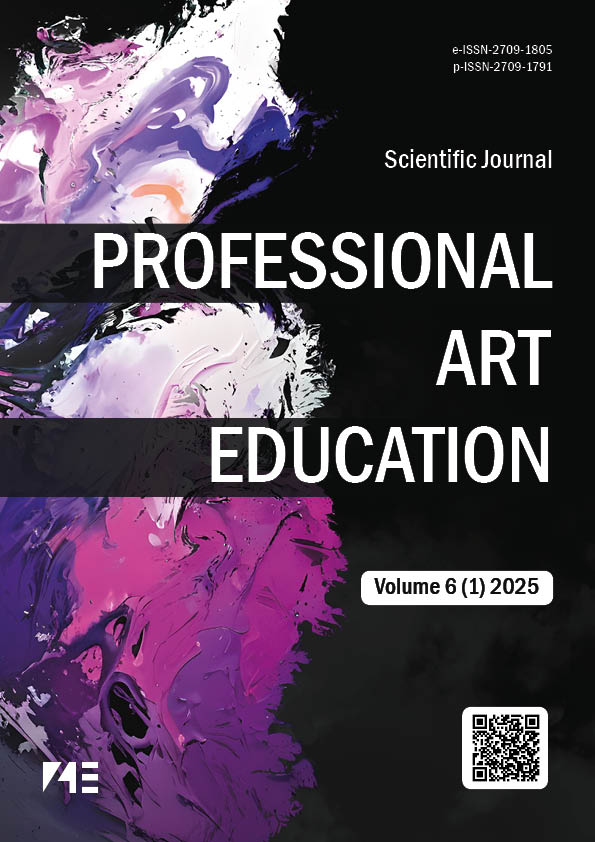Features of creating pedagogical conditions for forming social competence in the conditions of professional music education
DOI:
https://doi.org/10.34142/27091805.2025.6.01.05Keywords:
pedagogical environment, interpersonal interaction, student socialization, arts education, communication skills, collective creativity, reflective cultureAbstract
The article aims to reveal the essence of pedagogical conditions as a system of specially organized components within the educational process that influence the formation of social competence among students of a specialized music college. The study focuses on identifying the characteristics of the musical educational environment and its role in socialization and personality development.
Methods and methodology. The research employs theoretical analysis and synthesis of pedagogical literature, as well as an interpretative approach to understanding the specifics of musical education as a socio-cultural phenomenon. Empirical observations of educational interactions and collective creative activities in music learning contexts are also considered.
Scientic novelty. This study provides a comprehensive conceptualization of pedagogical conditions that support social competence development in music students by emphasizing the unique features of the musical educational environment – such as intensive interpersonal interaction, collective creativity, and emotional expressiveness.
Results. It is established that the musical arts function as an effective medium of socialization by facilitating the comprehension of social phenomena, moral norms, and value orientations. The research highlights the integration of individual lessons, group performances, stage activity, and socio-cultural initiatives as critical factors for fostering empathy, communication skills, responsibility, cooperation, and self-expression. Key pedagogical conditions are identified, including subject-subject interaction, collective activities, nurturing educational environments, student involvement in social initiatives, use of interactive teaching methods, and the cultivation of reflective practice. The systemic implementation of these conditions significantly contributes to the development of socially mature personalities among music students.
Conclusions. The study concludes that harmonizing professional training with social development within an arts educational institution creates favorable conditions for students' holistic growth. This integrated approach enhances not only professional competencies but also essential social qualities necessary for successful interaction in professional and social spheres.
Downloads
References
Дегтярьова, Г. А. (2018). Теоретичні і методичні основи розвитку інформаційно-комунікаційної компетентності вчителів філологічних дисциплін у системі післядипломної освіти : автореф. дис. … д-ра. пед. наук : 13.00.04 / Харків. 40. https://uacademic.info/ua/document/0518U000346
Ілляхова, М. В. (2019). Організаційно-педагогічні умови розвитку професійної креативності науково-педагогічного працівника. Науковий часопис Національного педагогічного університету імені М.П. Драгоманова. Серія 5: Педагогічні науки: реалії та перспективи, (67), 105–109.
Клименко, Л. В. (2025). Педагогічні умови попередження серед студентської молоді явища свідомої бездітності [Дис. докт. філософії]. Ніжинський державний університет імені Миколи Гоголя, Ніжин.
Левандовський, М.Ю. (2025). Теоретичні підходи до визначення сутності соціальної компетентності здобувачів фахового музичного коледжу. Modern Science, Economy and Digital Innovation: Collection of Scientific Papers with Proceedings of the 3rd International Scientific and Practical Conference. International Scientific Unity. May 7-9, 2025. Bucharest, Romania. https://doi.org/10.70286/ISU-07.05.2025
Марченко, О. (2023). Дослідження факторів впливу освітнього середовища закладу вищої освіти на формування професійних і соціальних характеристик майбутніх фахівців. European Science, 20(3), 117–126. https://doi.org/10.30890/2709-2313.2023-20-03-015
Московчук, О. С. (2020). Формування соціальної компетентності студентів вищих педагогічних навчальних закладів в умовах студентського самоврядування [дис. канд. пед. наук]. Вінницький державний педагогічний університет імені Михайла Коцюбинського, Вінниця.
Полякова, Г. А., & Білоконенко, Г. В. (2020). Розвиток освітнього середовища інноваційно-активного університету: особливості та критерії. Проблеми економіки, 4(46), 279–293. https://doi.org/10.32983/2222-0712-2020-4-279-293
Смолюк, С. В. (2016). Типологія розвивального освітнього середовища початкової школи. Науковий вісник Національного університету біоресурсів і природокористування України, (233), 244–252. http://nbuv.gov.ua/UJRN/nvnau_ped_2016_233_38
Сухомлин, О. А. (2019). Формування цифрової компетентності у студентів філологічних спеціальностей як психологічно-педагогічна проблема. Молодий вчений, 8(72), 255–259. https://doi.org/10.32839/2304-5809/2019-8-72-54
Тороп, К. С. (2022). Теоретичні і методичні засади формування ключових компетентностей в учнів з порушеннями інтелектуального розвитку [дис. докт. пед. наук]. Інститут спеціальної педагогіки і психології імені Миколи Ярмаченка НАПН України, Київ. 482 с.
Федоруц, М. В. (2019). Структурно-функціональна модель формування соціальної компетентності старшокласників засобами неформальної освіти. Науковий вісник Ужгородського національного університету : серія: Педагогіка. Соціальна робота / гол. ред. І.В. Козубовська. Ужгород : Говерла. 2 (45). https://doi.org/10.24144/2524-0609.2019.45.217-222
Benish-Weisman, M. & Daniel, E. & Knafo-Noam, A. (2017). The Relations Between Values and Aggression: A Developmental Perspective. https://doi.org/10.1007/978-3-319-56352-7_5
Hattie, J. (2012). Visible learning for teachers: Maximizing impact on learning. Routledge. https://doi.org/10.4324/9780203181522
Schunk, D. H., & DiBenedetto, M. K. (2021). Self-efficacy and human motivation. In A. J. Elliot (Ed.), Advances in motivation science (pp. 153–179). Elsevier Academic Press. https://doi.org/10.1016/bs.adms.2020.10.001
Wang, W., Han, L., Lu, Q., Lv, X., Liu, Y., & Wang, D. (2024). Research on the impact of the socio-educational environment on the academic performance of college students: The mediating role of study motivation. Frontiers in Psychology, (14), Article 1289064. https://doi.org/10.3389/fpsyg.2023.1289064
Wentzel, K. R. (2021). Motivational decision-making in achievement settings: A competence-in-context approach. In A. J. Elliot (Ed.), Advances in motivation science (pp. 245–284). Elsevier Academic Press. https://doi.org/10.1016/bs.adms.2020.06.002
Downloads
Published
License
Copyright (c) 2025 Лугова Вікторія, Левандовський Михайло (Автор)

This work is licensed under a Creative Commons Attribution-NonCommercial 4.0 International License.















